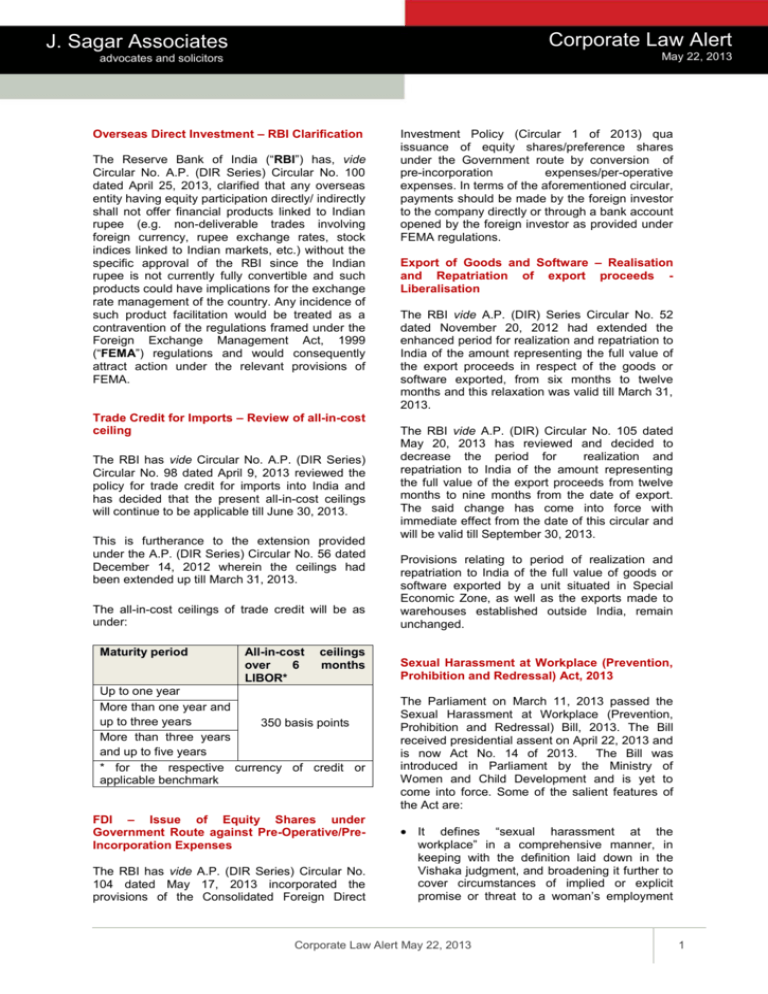
Corporate Law Alert
J. Sagar Associates
May 22, 2013
advocates and solicitors
Overseas Direct Investment – RBI Clarification
The Reserve Bank of India (“RBI”) has, vide
Circular No. A.P. (DIR Series) Circular No. 100
dated April 25, 2013, clarified that any overseas
entity having equity participation directly/ indirectly
shall not offer financial products linked to Indian
rupee (e.g. non-deliverable trades involving
foreign currency, rupee exchange rates, stock
indices linked to Indian markets, etc.) without the
specific approval of the RBI since the Indian
rupee is not currently fully convertible and such
products could have implications for the exchange
rate management of the country. Any incidence of
such product facilitation would be treated as a
contravention of the regulations framed under the
Foreign Exchange Management Act, 1999
(“FEMA”) regulations and would consequently
attract action under the relevant provisions of
FEMA.
Trade Credit for Imports – Review of all-in-cost
ceiling
The RBI has vide Circular No. A.P. (DIR Series)
Circular No. 98 dated April 9, 2013 reviewed the
policy for trade credit for imports into India and
has decided that the present all-in-cost ceilings
will continue to be applicable till June 30, 2013.
This is furtherance to the extension provided
under the A.P. (DIR Series) Circular No. 56 dated
December 14, 2012 wherein the ceilings had
been extended up till March 31, 2013.
The all-in-cost ceilings of trade credit will be as
under:
Maturity period
All-in-cost
over
6
LIBOR*
ceilings
months
Up to one year
More than one year and
up to three years
350 basis points
More than three years
and up to five years
* for the respective currency of credit or
applicable benchmark
FDI – Issue of Equity Shares under
Government Route against Pre-Operative/PreIncorporation Expenses
The RBI has vide A.P. (DIR Series) Circular No.
104 dated May 17, 2013 incorporated the
provisions of the Consolidated Foreign Direct
Investment Policy (Circular 1 of 2013) qua
issuance of equity shares/preference shares
under the Government route by conversion of
pre-incorporation
expenses/per-operative
expenses. In terms of the aforementioned circular,
payments should be made by the foreign investor
to the company directly or through a bank account
opened by the foreign investor as provided under
FEMA regulations.
Export of Goods and Software – Realisation
and Repatriation of export proceeds Liberalisation
The RBI vide A.P. (DIR) Series Circular No. 52
dated November 20, 2012 had extended the
enhanced period for realization and repatriation to
India of the amount representing the full value of
the export proceeds in respect of the goods or
software exported, from six months to twelve
months and this relaxation was valid till March 31,
2013.
The RBI vide A.P. (DIR) Circular No. 105 dated
May 20, 2013 has reviewed and decided to
decrease the period for
realization and
repatriation to India of the amount representing
the full value of the export proceeds from twelve
months to nine months from the date of export.
The said change has come into force with
immediate effect from the date of this circular and
will be valid till September 30, 2013.
Provisions relating to period of realization and
repatriation to India of the full value of goods or
software exported by a unit situated in Special
Economic Zone, as well as the exports made to
warehouses established outside India, remain
unchanged.
Sexual Harassment at Workplace (Prevention,
Prohibition and Redressal) Act, 2013
The Parliament on March 11, 2013 passed the
Sexual Harassment at Workplace (Prevention,
Prohibition and Redressal) Bill, 2013. The Bill
received presidential assent on April 22, 2013 and
is now Act No. 14 of 2013.
The Bill was
introduced in Parliament by the Ministry of
Women and Child Development and is yet to
come into force. Some of the salient features of
the Act are:
It defines “sexual harassment at the
workplace” in a comprehensive manner, in
keeping with the definition laid down in the
Vishaka judgment, and broadening it further to
cover circumstances of implied or explicit
promise or threat to a woman’s employment
Corporate Law Alert May 22, 2013
1
Corporate Law Alert
J. Sagar Associates
May 22, 2013
advocates and solicitors
prospects or creation of hostile work
environment or humiliating treatment, which
can affect her health or safety.
The Act covers organised or unorganised
sectors, public or private and covers clients,
customers and domestic workers as well
The term workplace has been broadly defined
to include within its scope organisations,
department, office, branch unit etc in the public
and
private
sector,
organized
and
unorganized, hospitals, nursing homes,
educational institutions, sports institutes,
stadiums, sports complex and any place
visited by the employee during the course of
employment including the transportation.
The
meaning
of
employee
covers
regular/temporary/ad
hoc/daily
wage
employees, whether for remuneration or not
and can also include volunteers.
The redressal mechanism provided in the Act
is in the form of Internal Complaints Committee
(“ICC”) and Local Complaints Committee
(“LCC”). All workplaces employing 10 or more
than 10 workers are mandated under the Act
to constitute an ICC. The ICC will be a 4
member committee under the Chairpersonship
of a senior woman employee and will include 2
members from amongst the employees
preferably committed to the cause of women or
has experience in social work/legal knowledge
and includes a third party member (NGO. Etc.) as
well.
A complaint must be filed within a period of
three (3) months, unless, the aggrieved
woman is able to prove grave circumstances.
The Act provides for conciliation where the
ICC has to make an effort to settle the matter
between the aggrieved woman and the
respondent.
The Committee is to recommend action in
case the compliant is found to be proved.
Punishment includes monetary punishment,
There is serious action prescribed in case the
complaint is found to be a malicious complaint,
The Act casts a duty on every employer to
create a safe environment which is free from
sexual harassment.
An employer will be liable to fine of Rs. 50,000
in case of violation of any of his obligations
under the Act.
In case of a domestic worker they can
approach the LCC.
The Act has been published in the Official Gazette
of India but will come into force only at a later date
as will be prescribed by the Central Government.
For further information please contact:
corporatecommercial@jsalaw.com
Disclaimer:
This newsletter is not an advertisement or any form of solicitation. This
newsletter has been compiled for general information of clients and does
not constitute professional guidance or legal opinion. Readers should
obtain appropriate professional advice.
J. Sagar Associates I advocates & solicitors
Gurgaon
New Delhi
Mumbai
Bangalore
Hyderabad
Copyright © J. Sagar Associates | all rights reserved
Corporate Law Alert May 22, 2013
2








